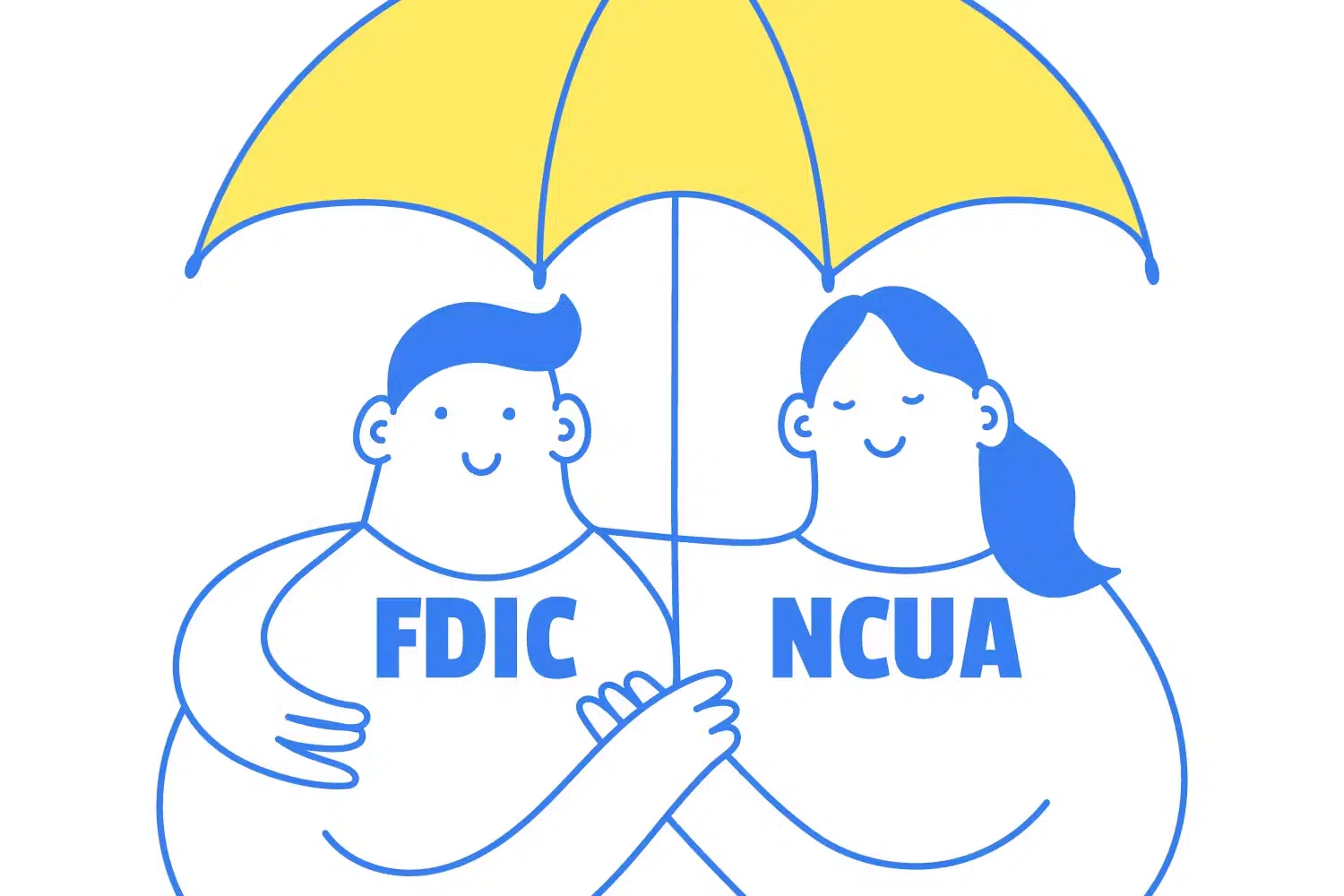
What's the Difference? FDIC vs NCUA

Great news for those with checking or savings accounts at federally insured credit unions or banks in the US: you have access to free deposit insurance of up to $250,000!
Thanks to forward-thinking governmental officials who acted many decades ago, such coverage is now applied free of charge to most deposit accounts. But did you know that the accounts in a bank are not insured by the same organization that insures credit union deposit accounts?
In this article, we’re going to look at the FDIC and NCUA— the two independent federal agencies that help keep your money safe. Here’s what you need to know.
Leave Your Bank Fees Behind
No account fees. No overdraft fees. No bank fees at all.
The Basics of the FDIC and NCUA
When it comes to your finances, it’s important to be informed so you can make the best decisions possible— especially when it comes to where you put your money. Understanding the role of the FDIC and NCUA can help you make better decisions about the institutions you choose to bank with.
What is the FDIC?
The Federal Deposit Insurance Corporation (FDIC) is an independent agency created by Congress in 1933 in response to bank failures during the Great Depression. In those days, if a bank failed, account holders lost most— if not all— of their money. The results were dire economic conditions and a country that had no confidence in its financial system.
The FDIC was created with two main goals: 1) to prevent bank runs by providing deposit insurance and 2) to supervise banks to ensure they operate safely and soundly.
Today, it insures deposits at banks and thrift institutions for up to $250,000 per depositor, per institution. This means that if a bank fails, which happens very rarely these days, the FDIC will pay back depositors up to $250,000 per account.
While deposit insurance is one of the main ways it achieves its mission, the FDIC also provides other services such as:
- Setting standards for safe banking practices
- Supervises and examines banks for operational safety and soundness
- Protecting consumers’ rights
- Making sure banks comply with all applicable laws
- Helping consumers resolve complaints or disputes with their bank or recover assets lost due to fraud or theft from a financial institution
Banking with institutions insured by the FDIC provides consumers with the confidence that their money is insured up to a certain amount.
What is the NCUA?
The Banking Act of 1933 wasn’t the only notable financial law that President Franklin D. Roosevelt. In 1934, Roosevelt signed the Federal Credit Union Act into law, which enabled credit unions to organize throughout the country under charters approved by the federal government.
However, credit union members weren’t covered by the protections of the FDIC.
Surprisingly, the National Credit Union Administration wouldn’t be founded for several decades. After the number of credit unions nationwide surpassed 10,000 in 1970, the independent federal agency was funded by an act of Congress and empowered to offer insurance equal to the FDIC’s.
Today, the National Credit Union Administration (NCUA) is the federal agency responsible for overseeing credit unions. Its mission is to serve as the primary regulator of credit union activities, ensuring their safe and sound operation while protecting their members’ assets.
To do this, the NCUA examines and supervises credit unions, administers insurance funds, and provides education and technical assistance to ensure full compliance with applicable laws and regulations. Like the FDIC, the NCUA insures deposits at credit unions for up to $250,000 per depositor, per institution. By actively regulating the industry, the NCUA helps to protect the financial integrity of over 5,500 federally insured credit unions and 100 million members across America.
Differences Between FDIC and NCUA
Thanks to the NCUA and FDIC, both credit unions and banks are equally protected.
Of course, there are a few subtle differences between the two, but the benefits are largely the same.
| FDIC | NCUA | |
|---|---|---|
| Who is served? | The FDIC serves and insures account holders at banks. | The NCUA serves and insures account holders at credit unions. |
| Who oversees the agency? | The FDIC is managed by a five-person board appointed by the President. | The NCUA is headed by a three-member board appointed directly by the President. |
| What is insured? | Checking accountsSavings accountsMoney market deposit accountsCertificates of deposit (CD)Other deposit accounts | Checking accounts (also called share drafts)Savings accountsMoney market deposit accountsCertificates of deposit (CD)Other deposit accounts |
| What is NOT insured? | Stocks and bondsMutual fundsAnnuitiesLife insurance policiesSafe deposit boxes and their contents | Stocks and bondsMutual fundsAnnuitiesLife insurance policiesSafe deposit boxes and their contents |
| How much is insured? | $250,000 per depositor, per insured institution, for each account ownership category | $250,000 per depositor, per insured institution, for each account ownership category |
| What are the ownership categories? | Single ownership accountsCertain retirement accountsJoint accountsRevocable trust accountIrrevocable trust accountEmployee benefit plan accountsCorporation, partnership, or unincorporated association accountsGovernment accounts | Single accountsCertain retirement accountsJoint accountsRevocable trust accountsIrrevocable trust accountsEmployee benefit plan accountsCorporation, partnership, or unincorporated association accountsGovernment accounts |
Same Coverage, Different Agencies
For over 50 years, members of credit unions have benefitted from the same protections as bank customers. The peace of mind offered by the National Credit Union Administration is just one of many reasons why people are choosing credit unions. Members get the same protections as banks, but with more perks like lower interest rates, higher dividends, and stellar customer service— just to name a few.
Curious about the growing credit union movement? More and more people are joining credit unions every day, preferring to do their banking with a member-owned financial cooperative instead of with traditional banks. Learn more here about what a credit union can do for you in this article: Benefits of Credit Unions vs Banks.


